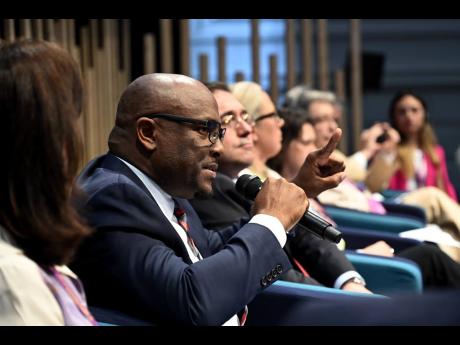St Lucian minister appeals for continued EU support to Caribbean
Edward cites damaging effects of climate change in address at forum
BRUSSELS, BELGIUM:
A ST LUCIAN minister has appealed for the European Union’s continued support of Caribbean nations through partnership, with the aim to help lessen the damaging effects of climate disasters associated with enormous costs in rebuilding exercises.
Shawn Edward, minister of education, sustainable development, innovation, science, technology and vocational training in St. Lucia, made this plea while offering remarks at the opening of the EU-Latin America and the Caribbean Forum – Partners in Change: Youth, Civil Society and Local Authorities, on Thursday.
Speaking on behalf of the Caribbean community, he expressed that climate change was a “an existential threat that can cripple us (small island developing states – SIDS) in a matter of minutes”, as it remained “one of the greatest collective challenges that modern humanity has confronted”.
While acknowledging that climate change has a detrimental effect on developed nations across the world, he contended that its impacts have a disproportionately negative impact on marginalised and underserved communities.
“We have small ... vulnerable countries and in the space of one to two hours ... we can witness our entire existence being decimated and being wiped away [by a weather event],” he said.
He added that by an existential threat, he meant that a country could “be a thriving country at 10 o’clock in the morning and by mid-day after the passage of a weather system”, the country’s citizens become vulnerable.
“We had a weather system in St. Lucia where from a year and a half ago, a country that is 26 miles in length, a weather system stationary above the northern half of St. Lucia and in the space of two hours, cars and trucks were floating in the streets like dry leaves and just a few miles down the road people were basking in sunshine,” he expressed, giving an example to the seriousness of the situation.
He added that in less than a day, the government had to locate funds to rebuild infrastructure and to replace appliances in the homes of its citizens.
In June, St. Lucia, among other eastern Caribbean countries, was impacted by the passage of Tropical Storm Bret. For St. Lucia, it was reported that mudslides occurred in some areas, and in other instances thousands of acres of banana crop were damaged, and more than half the island was without electricity.
Borrow to rebuild
Additionally, Tropical Storm Bret was said to have destroyed homes and relocated about 120 individuals to shelters in the Lesser Antilles islands of St Vincent and the Grenadines.
Edward noted that such catastrophic events forced smaller countries to borrow money to rebuild and that it was an unsustainable solution that could cause a country to wind up in debt and result in a crippling of the economy.
The United Nations Framework Convention on Climate Change (UNFCCC) COP27 in November last year reached an agreement to provide loss and damage funding to vulnerable countries affected by the adverse impacts of climate change, with a concentration on loss and damage management.
Edward stated that while millions of dollars have been pledged to St. Lucia and other small island countries – by organisations he did not name – access to such funds has been “very bureaucratic” and “frustrating”.
“And so, with the establishment of loss and damage fund, we believe that we have a better avenue to access monies that would cause us to roll out adaptation and mitigation programmes so as to guide our people against climate change,” he said.
“SIDS are responsible for less than one per cent of global gas emission that drive climate change, yet SIDS are amongst the most vulnerable to climate impacts due to a range of systemic, geographic, climate issues which heighten our vulnerability,” he said.
He noted that this must be not only acknowledged, but addressed in the mitigation and adaptation strategies that will also be discussed at the 2023 UN Climate Change Conference scheduled for November 30 to December 12, 2023, in Dubai, United Arab Emirates.

